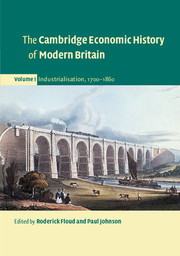Book contents
- Frontmatter
- Chapter1 Accounting for the Industrial Revolution
- Chapter2 Industrial organisation and structure
- Chapter3 British population during the ‘long’ eighteenth century, 1680–1840
- Chapter4 Agriculture during the industrial revolution, 1700–1850
- Chapter5 Industrialisation and technological change
- Chapter6 Money, finance and capital markets
- Chapter7 Trade: discovery, mercantilism and technology
- Chapter8 Government and the economy, 1688–1850
- Chapter9 Household economy
- Chapter10 Living standards and the urban environment
- Chapter11 Transport
- Chapter12 Education and skill of the British labour force
- Chapter13 Consumption in eighteenth- and early nineteenth-century Britain
- Chapter14 Scotland
- Chapter15 The extractive industries
- Chapter16 The industrial revolution in global perspective
- Bibliography
- Index
- References
Chapter5 - Industrialisation and technological change
Published online by Cambridge University Press: 28 March 2008
- Frontmatter
- Chapter1 Accounting for the Industrial Revolution
- Chapter2 Industrial organisation and structure
- Chapter3 British population during the ‘long’ eighteenth century, 1680–1840
- Chapter4 Agriculture during the industrial revolution, 1700–1850
- Chapter5 Industrialisation and technological change
- Chapter6 Money, finance and capital markets
- Chapter7 Trade: discovery, mercantilism and technology
- Chapter8 Government and the economy, 1688–1850
- Chapter9 Household economy
- Chapter10 Living standards and the urban environment
- Chapter11 Transport
- Chapter12 Education and skill of the British labour force
- Chapter13 Consumption in eighteenth- and early nineteenth-century Britain
- Chapter14 Scotland
- Chapter15 The extractive industries
- Chapter16 The industrial revolution in global perspective
- Bibliography
- Index
- References
Summary
INTRODUCTION
Technological change was a central component in the industrialisation process of the late eighteenth and early nineteenth centuries, and thus in the making of the modern world economy. Nevertheless, more than two centuries after the beginnings of industrialisation, our understanding of the factors that impelled and shaped the development, diffusion and impact of the new technologies of early industrialisation remains far from complete. As a consequence, important questions concerning the place and interpretation of technological change in industrialisation remain unresolved.
The idea that we know relatively little about the sources and outcomes of innovation in the industrial revolution may seem strange, since there is a large historical literature organised explicitly or implicitly around the idea that technological change and industrialisation are intimately linked. Indeed there are many writers for whom new technologies are industrialisation, and so the emergence of new techniques is implicitly or explicitly a fundamental causal event. But the very size of the literature tends to obscure the fact that it actually tells us rather little about the dynamics of technological change in the industrial revolution, and particularly its impacts on growth. So although technological change is usually seen as a central element in the economics of industrialisation there is frequently no satisfactory account of the relationships between technological change and industrial growth. To put it differently, there are few comprehensive treatments of the technologies involved in the industrialisation process, in the sense of treatments that integrate economic, social and technological dynamics. Although such a task cannot be achieved within the space available here, nevertheless this chapter seeks to describe some broad patterns of technological change during the first industrial revolution, and to place them within an interpretative framework.
- Type
- Chapter
- Information
- The Cambridge Economic History of Modern Britain , pp. 117 - 146Publisher: Cambridge University PressPrint publication year: 2004
References
- 10
- Cited by



